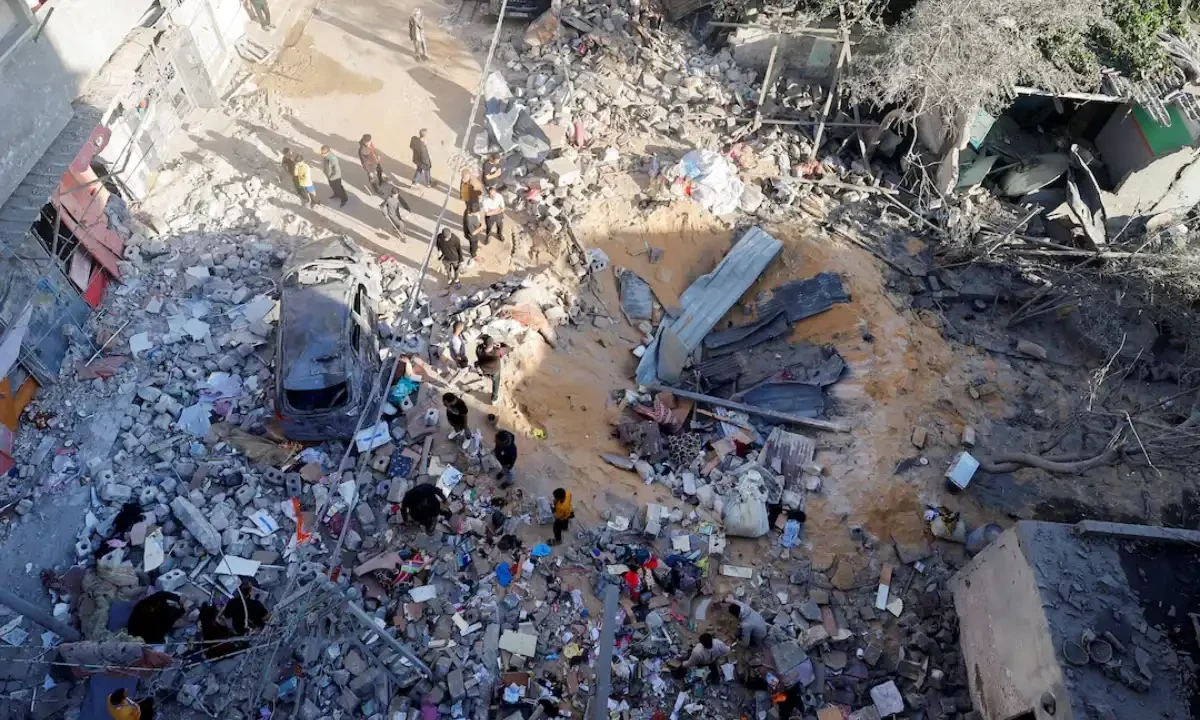
Hamas reported engaging Israeli troops on the outskirts of Gaza’s densely populated southern city of Rafah on Wednesday, following news that the United States had suspended a shipment of potent bombs destined for potential use in a major offensive by Israel.
Amid efforts to prevent an Israeli incursion into Rafah, the United States expressed optimism about a revised Hamas ceasefire proposal, with negotiations set to resume in Cairo on Wednesday.
While Israel has threatened a significant assault on Rafah to suppress what it alleges are thousands of Hamas fighters entrenched there, international entities, including Western nations and the United Nations, have cautioned against a full-scale attack due to its humanitarian repercussions.
Hamas confirmed its fighters’ clashes with Israeli forces in the eastern part of Rafah, where hundreds of thousands of Palestinians have sought refuge from ongoing combat in other parts of the enclave. Islamic Jihad also reported attacks on Israeli soldiers and military vehicles near the airport east of Rafah.
Rafah’s mayor, Ahmed Al-Sofi, issued an urgent appeal to the international community, describing the dire humanitarian situation in the city, marked by loss of innocent lives, shattered families, and widespread destruction.
Approximately 10,000 Palestinians have fled Rafah since Monday, according to UNRWA spokesperson Juliette Touma, while the Hamas-run Gaza government media office cited the number in the tens of thousands.
A senior U.S. official, speaking anonymously, disclosed that the Biden administration had temporarily halted a weapons shipment to Israel last week, purportedly in response to the anticipated offensive in Rafah. However, both the White House and Pentagon declined to comment.
The reported suspension includes 1,800 2,000-lb bombs and 1,700 500-lb bombs, marking a departure from the Biden administration’s staunch support for Israel since Hamas’ October 7 attack.
Israeli officials refrained from confirming the report, asserting readiness to utilize all means necessary for defense. While tanks crossed the Rafah border with Egypt, closing off vital aid routes and evacuation paths, Israel announced the reopening of the Kerem Shalom crossing in southern Gaza for humanitarian aid delivery.
The Israeli military disclosed uncovering Hamas infrastructure in multiple locations in eastern Rafah, conducting targeted operations near the Rafah crossing, and launching airstrikes across Gaza.
Amid ongoing clashes, armed groups of Hamas, Islamic Jihad, and Fatah reported continued skirmishes in central and northern Gaza, underscoring the volatile situation in the region.
In Cairo, delegations to negotiations from Hamas, Israel, the U.S., Egypt and Qatar reacted positively to their resumption on Tuesday and meetings were expected to continue on Wednesday, two Egyptian sources said.
CIA Director Bill Burns was to travel from Cairo to Israel on Wednesday to meet Israeli Prime Minister Benjamin Netanyahu and his Mossad counterpart, an Israeli government source said.
Israel on Monday declared that a three-phase proposal approved by Hamas was unacceptable because terms had been watered down. White House spokesperson John Kirby said a new text presented by Hamas suggests the remaining gaps can “absolutely be closed.”
The proposal included a first phase with a six-week ceasefire, an influx of aid to Gaza, the return of 33 Israeli hostages, alive or dead, and the release by Israel of 30 detained Palestinian children and women for each released Israeli hostage, according to several sources.
Since a week-long ceasefire in November, the only pause so far, the two sides have been blocked by Hamas’ refusal to free more Israeli hostages without a promise of a permanent end to the conflict and Israel’s insistence on only a temporary halt.
Israel’s offensive has killed 34,844 Palestinians in seven months of war in Gaza, most of them civilians, the Gaza health ministry said.
The war began when Hamas militants attacked Israel on Oct. 7, killing about 1,200 people and abducting 252 others, of whom 128 remain hostage in Gaza and 36 have been declared dead, according to the latest Israeli figures.
Al-Sofi, Rafah’s mayor, said 1.4 million people sheltering in the city had nowhere to go. The coastal al-Mawasi area where those in eastern neighbourhoods were being told to move to “lacks the necessities of life”, he said.
Around 200 patients from Rafah’s Abu Youssef al-Najjar Hospital, in an area designated by the Israeli army as a combat zone, were forced to evacuate to the west of the city after receiving calls warning them to leave, health officials said.
The Punjab Safe Cities Authority has unveiled a comprehensive online complaint tracking system, marking significant…
In Silicon Valley, where tech leaders profit from our digital behaviors, some executives find it…
US trading partners in Asia are grappling with new uncertainties after President Trump unveiled his…
The United Arab Emirates (UAE) has successfully thwarted a sophisticated cyber-attack targeting its digital infrastructure…
Pakistan and the UK have reaffirmed their commitment to deepening bilateral cooperation across multiple sectors…
A team of researchers from the University of California San Francisco and Wayne State University…
This website uses cookies.